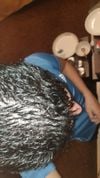community Roughly 4 months minoxidil, dermarolling, and on/off finasteride (Before/after)
The conversation discusses hair loss treatment over four months using minoxidil, dermarolling, and intermittent finasteride. The user switched from prescription minoxidil to a cheaper alternative, Kirkland, with a similar concentration.
